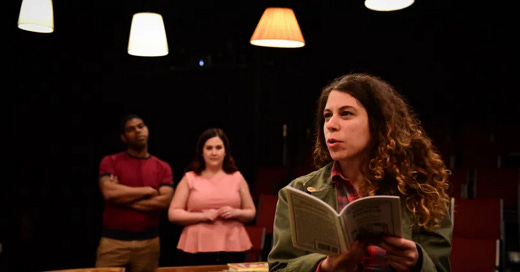JOHANNA FAUSTUS Is a Cloudy Adaptation
Breon Arzell, Kate Carson-Groner and Dana Omar. Photo by Evan Hanover
Armed with innovative storytelling tools, the Hypocrites can transport you through time and space with simple, committed magic, often leaving the wizardry at the tip of their fingers to ignite whenever they wish. It is no surprise they present epic stories in a modern, easy-to-connect-with style. They have a knack for it. JOHANNA FAUSTUS is molded with a few of those special ingredients. It is also barely scratching the surface of its inspired source, the dense epic Marlowe drama.
Research and passion for the original work are evident. The production is chock-full of nods and parallels, including a devil ditty distraction by Mephistophilis, Latin forearm tattoos, and a quite lovely personification of the seven deadly sins. But when getting to the nub of it, it diverges from the source and begins to ask some different questions. Marlowe proposes to ask why God permits the existence of Evil and if a man’s damnation is willed by God, by Satan, and ultimately by himself.
Adapters Sean Graney and Emily Casey ask “Can success really bring power?” (as per the press release) and “Should religion be eradicated?” (a fascinating and best-rooted question for this interpretation). The first query wasn’t given much sunlight and water. (Probably a blessing in disguise, not much new there.) But the second, oh, well that’s really a great one to ask! Especially because it leads to the even better question—why does man (not God) permit the existence of Evil? And even if we can’t answer that, we all know this ensemble, under Graney’s direction, can potentially shape one heck of an exploration. They can avoid testing Faustus’ willingness to sin by having Lucifer send her on a task that brings up entirely new questions altogether, dispel some of their own groundwork and convolute the plot with a bit with the pope’s ring.
In Marlowe’s time, the scenes in Rome are meant for satirical commentary on the religious establishment. This approach would have served as an excellent opportunity (had it handled itself a tad more lightly) to build a strong case for its divinity inquiries. Especially because we are shown that, as an old friend used to say, “even the righteous won’t escape the pits which Evil has set aflame.” Instead, this devilish quest was used to create a trigger for a hasty end to the play. Luckily, plenty of well-executed comedy peppered the production, a favorite being a clever mouth-full that put the humor in Fausthumorus.
But let’s look at the fact that this Dr. Faustus is a her. If there was a reason this adaptation chose a female perspective, the reason was cloudy. Johanna Faustus seemed more like a victim of her circumstance rather than a driving force behind her actions. Very much like her predecessor, she should be given choices that help her or damn her, but are hers to select. The one big decision this protagonist was allowed to make forced her to be damned for the wrong reasons, and all of it supports the false narrative of the weaker sex myth. The Devil just invited you to dance, Johanna. Go show him how to tango like only a lady can. Be it leading to damnation.
May 23rd, 2016





